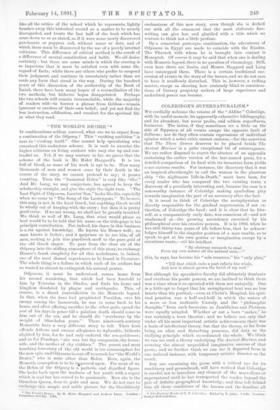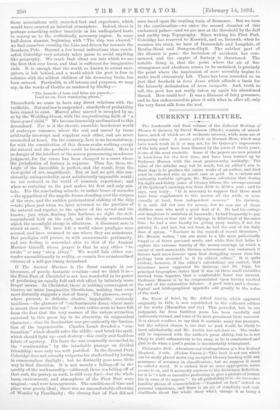COLERIDGE'S SUPERNATURALISM.*
WE cordially welcome the reissue of the " Aldine " Coleridge, with its useful memoir, its apparently exhaustive bibliography, and its abundant., but never prolix, and seldom superfluous, footnotes. The latter, if they sometimes err a little on the side of flippancy, at all events escape the opposite fault of dullness ; nor do they often contain expressions of individual opinion which a sober critic cannot endorse,—for the assertion that The Three Graves deserves to be placed beside The Ancient Mariner is a quite exceptional hit of extravagance. We are rather disposed to regret the absence of an appendix containing the earlier version of the last.named poem, for a detailed comparison of its final with its immature form yields some curious results. For instance, the discovery that it was an inspired afterthought to call the woman in the phantom ship "the nightmare Life-in-Death," must have been, for every reader who has compared the two existing texts, a discovery of a peculiarly interesting sort, because the case is a noteworthy instance of Coleridge making symbolism play towards imagination the part of an accessory after the fact.
It is usual to think of Coleridge the metaphysician as directly responsible for the gradual supersession, if not ex- tinction, of Coleridge the bard ; and it is clear that he him- self, at a comparatively early date, was conscious of—and not unalarmed at—the growing ascendency exercised by his philosophical over his creative powers. It is in 1802, when he has still thirty-two years of life before him, that be acknow- ledges himself in the singular position of a man unable, so to speak, to get at his own genius or imagination except by a circuitous route,—vid, his intellect.
"By abstruse research to steal From my own nature all the natural man,—" this, he says, has become his "sole resource," his "only plan," "Till that which suits a part infects the whole, And now is almost grown the habit of my soul."
But although his speculative faculty did ultimately dominate and overbear his poetic powers, we are inclined to think there was a time when it co-operated with them not unloyally. One is a little apt to forget that his metaphysical bent was no less innate than his poetical,—even at Christ's Hospital, his spiri tual potation was a half-and-half in which the waters of a more or less authentic Castaly, and the " philosophic draughts " from such fountains as Jamblichus and Plotinus, were equally mingled. Whether or not a born "maker," he was certainly a born theorist ; and we believe not only that under all his most important artistic achievements there was a basis of intellectual theory, but that the theory, so far from being an alien and disturbing presence, did duty as the unifying principle which co-ordinated the whole. We think we can see such a theory underlying The Ancient Mariner, and securing the almost unqualified imaginative success of that poem; and we further think we can see it departed from in one isolated instance, with temporary artistic disaster as the result.
Any one examining the poem with a critical eye for its machinery and groundwork, will have noticed that Coleridge is careful not to introduce any element of the marvellous or supernatural until he has transported the reader beyond the pale of definite geographical knowledge, and thus left behind him all those conditions of the known and the familiar, all
* Tho Poetical Works of S. T. Coloridvo, Edited by T. Ache. 2 vole. London: George Bell and Sons,
those associations with recorded fact and experience, which would have created an inimical atmosphere. Indeed, there is perhaps something rather inartistic in his undisguised haste to convey us to the cesthetically necessary region. In some half-dozen stanzas, beginning with " The ship was cleared," we find ourselves crossing the Line and driven far towards the Southern Pole. Beyond a few broad indications thus vouch- safed, Coleridge very astutely takes pains to avoid anything like geography. We reach that silent sea into which we are the first that ever burst, and that is sufficient for imaginative ends. It is enough that the world, as known to actual navi- gators, is left behind, and a world which the poet is free to colonise with the wildest children of his dreaming brain, has been entered. Forthwith, to all intents and purposes, we may say, in the words of Goethe as rendered by Shelley :—
" The bounds of true and false are passed;— Lead us on, thou wandering gleam."
Thenceforth we cease to have any direct relations with the verifiable. Natural law is suspended ; standards of probability have ceased to exist. Marvel after marvel is accepted by us, as by the Wedding-Guest, with the unquestioning faith of "a three-years' child." We become insensibly acclimatised to this dreamland. Nor is it the chaotic, anarchic, incoherent world of arabesque romance, where the real and unreal by turns arbitrarily interrupt and supplant each other, and are never reconciled at heart. On the contrary, here is no inconsistency, for with the constitution of this dream-realm nothing except the natural and the probable could be inconsistent. Here is no danger of the intellect or the reason pronouncing an adverse judgment, for the venue has been changed to a court where the jurisdiction of fantasy is supreme. Thus far, then, the Logic of the Incredible is perfect, and the result, from the view-point of art, magnificent. But at last we quit this con- sistently, unimpeachably, most satisfactorily impossible world ; we are restored to the world of common experience ; and when so restoring us, the poet makes his first and only mis- take. For the concluding miracle, or rather brace of miracles —the apparition of the angelic forms standing over the corpses of the crew, and the sudden preternatural sinking of the ship —take place just when we have returned to the province of the natural and regular, to the sphere of the actual and the known ; just when, floating into harbour, we sight the well- remembered kirk on the rock, and the steady weathercock which the moonlight steeps in silentness. A dissonant note is struck at once. We have left a world where prodigies were normal, and have returned to one where they are monstrous. But prodigies still pursue us with unseasonable pertinacity, and our feeling is somewhat akin to that of the Ancient Mariner himself, whose prayer is that he may either " be awake" or may "sleep alway." We would fain either sur- render unconditionally to reality, or remain free as naturalised citizens of a self-govlrning dreamland.
If The Ancient Mariner is the finest example in our literature, of purely fantastic creation—and we think it is— the First Part of Christabel is not less wonderful in its power of producing an equally full and rich effect by infinitely more frugal means. In Christabel, there is nothing extravagant or bizarre, no mere imaginative libertinism, nothing that even most distantly suggests a riot of fancy. The glamour, every- where present, is delicate, elusive, impalpable, curiously insidious,—the glamour of " enchantments drear, where more is meant than meets the ear." Acute critics seem to have felt from the first that the very essence of the unique attraction exercised by this poem lay in its obscurity, its enigmatical character,—that its fascination was pre-eminently the fascina- tion of the impenetrable. Charles Lamb dreaded a "con- tinuation" which should solve the riddle—and break the spell: which should light up—and destroy—this costly and faultless fabric of mystery. His fears (he was eventually reconciled to the " continuation" by the inimitable passage on divided friendship) were only too well justified. In the Second Part, Coleridge does not actually vulgarise his shadowland by letting in commonplace daylight ; but he distinctly goes some little way in that direction. It is not merely a falling-off in the quality of the workmanship—(although there is a falling-off of that sort, the poetry, as such, is still very fine)—but the whole basis, environment, and atmosphere of the First Part were magical,—and were homogeneous. The conditions of titae and place were purely ideal ; there was no uncomfortable elbowing of Wonder by Familiarity; the clumsy foot of Fact did not
once tread upon the rustling train of Romance. But we tarn to the continuation—we enter the second chamber of this enchanted palace—and we are met at the threshold by the dull' and earthy imp, Topography. Since writing his First Part, Coleridge has removed to Keswick, and so, forsooth, when he resumes his story, we hear of Borrowdale and Langdale, of Bratba-Head and Dungeon-Ghyll. The subtlest part of the illusion is gone : the incursion of accidents has com- menced, and the empire of fantasy is threatened. The notable thing is, that the point where the air of fine strangeness and aloofness ceases to be sustained, is precisely the point where the impression of mere 'unreality begins to make itself obtrusively felt. There has been conceded to tut just that foothold in terra firma which affords a basis for the leisurely delimitation of terra incognita. And, truth to• tell, the poet has not really taken up again his abandoned thread. How could he ? It was a filament of fairy gossamer,. and he has endeavoured to piece it with what is, after all, only the very finest silk from the reel.



































 Previous page
Previous page